Commission checks are great, but they don’t build loyalty, culture, or momentum on their own. If you’ve just started growing your sales team, now’s the time to lay the foundation for motivation that lasts. Early recognition fuels engagement, and in fact, 90% of employees say it drives them to work harder. This guide is for founders, new sales leaders, and small business owners ready to go beyond the bonus.
Why should you care about sales team recognition
You don’t need a budget to build a motivated sales team. What you do need is a habit of recognition — early, often, and in ways that actually matter. Here’s what it buys you:
It drives behavior before revenue is recognized
Recognition sparks momentum, especially in the early stages of the sales cycle. Shoutouts, badges, or team kudos turn effort into energy, and that’s the kind of motivation that shows up later in your accurate revenue recognition.
It protects your sales culture like an internal audit
Relying too much on cash rewards can break your team. You get burnout, sandbagging, and a culture where reps only chase short-term wins. Layer in peer recognition programs and meaningful rewards for performance obligations like collaboration, consistency, or CRM hygiene, and you build a culture that compounds.
It’s better than bonuses at keeping top reps loyal
High performers don’t just want cash. They want visibility, growth, and to know they’re not just another cell in your financial statements. Smart revenue recognition policies track deals — smart leaders recognize the humans behind them. Recognition keeps talent from wandering, and turnover from tanking your numbers.
It turns recognition into a strategy, not a random event
Think of recognition like accrual accounting: track the value when it’s earned, not just when the customer pays. Waiting until someone crushes their target to say 'good job' is too late. Recognize early wins — key calls, great follow-ups, stellar demos — and reinforce the habits that hit your sales targets before the deal is done.
How to recognize your sales team
1. Celebrate early wins (even the small ones)
Many business owners wait too long to react to sales activity. There’s always more to do, bigger goals ahead. But to a sales rep just getting started, early sales wins are just as important and silence makes it feel like their work doesn’t matter yet.
That first logged deal, demo booked, or positive reply isn’t just busywork. It’s a critical event in your sales recognition process. It means the rep is learning how to move a deal forward and that deserves attention.
Just small acts of recognition can build motivation, confidence, and better sales performance. Publicly recognizing early progress builds the culture you want, before you even hit your revenue targets.
Try this checklist to keep early wins visible:
- Ring a literal bell or sound (even virtually) when a deal closes
- Shout out 'firsts' in your team Slack: first deal, first positive reply, first testimonial
- Keep a lightweight 'Win Log' in a shared doc — rep name, what happened, and a kudos column
- Use templated auto-emails for quick congrats ('Loved seeing your first closed deal — here’s to many more!')
- Bring in a small treat — coffee, bagels, chocolate — after an initial win is always a hit
When done right, even small recognition creates meaningful rewards. You’re not just recording revenue — you’re shaping behavior and culture that scales.
Section 2: Make it public (but personal)
Recognition hits harder when it’s seen. But for some reps, public acknowledgment can feel more awkward than affirming. How you make it public matters just as much as what you’re recognizing.
The goal is to make someone feel valued in a way that matches who they are. Some reps might love a company-wide Slack post or LinkedIn shoutout. Others prefer a direct message where the client or manager copies them in with a genuine 'You crushed it.'
Public doesn’t mean performative — it means intentional, visible recognition that feels earned, not staged.
5 ways to celebrate publicly (without making it weird):
- Post a quick shoutout on LinkedIn, your own or the company’s, with a rep quote or behind-the-scenes moment
- Share a customer kudos email and CC the rep so they see the love
- Feature standout reps in a newsletter or internal update (bonus: explain what they did well for others to learn from)
- Add a rep win or testimonial mention to onboarding docs to show new hires what great looks like
- Keep a 'recognition wall' in the office or shared team doc — mix metrics with moments (e.g., 'best saved deal' or 'best turnaround')

Done right, this kind of visibility reinforces strong behavior and helps build a culture where people lift each other up — not just compete in silence.
Garry Ridge has built a culture where public recognition is a core leadership responsibility. He often uses company-wide emails, town halls, and internal newsletters to spotlight employees’ achievements, both big and small. Ridge’s messages are personal and specific, celebrating not just results but also effort, creativity, and teamwork. This has contributed to WD-40’s exceptionally high employee engagement scores (over 90%).
Section 3: Introduce low-budget sales games
Games can energize your sales team — but only if they’re simple to join, timed right, and rooted in real behaviors. You can’t force fake fun and it’s likely that nobody wants to play a game at 11am on a packed Wednesday. Pushing it will backfire and make people resent the game, but slot it in at 3pm on Friday, and suddenly you’ve got buy-in.
Try one of these simple formats:
- 'Most No’s' challenge – Normalize rejection. Reward the rep who racks up the most polite turndowns in a week.
- Sales Bingo – Fill a 5x5 grid with small, useful actions (like 'logged a call' or 'updated notes'). First to bingo gets bragging rights.
- Rotating trophy or token – A low-stakes award that lives on a rep’s desk for the week — visible, symbolic, and easy to pass on.
Make it optional, make it visible, and most importantly — make it feel like something reps want to join, not something they’re forced into. The right format can turn a quiet afternoon into a high-energy finish.
Section 4: Let peers give praise too
Recognition doesn’t always have to come from the top. In fact, praise from a teammate can feel even more genuine, because it’s coming from someone whose sees your performance first hand. Peer-led shoutouts encourage trust, collaboration, and everyday appreciation, not just spotlight moments.
Start with lightweight rituals: a #shoutouts Slack channel, a rotating 'Team MVP' voted by the team, or even a shared doc where people drop kudos.

At Zappos, peer recognition is at the heart of the company culture. Employees nominate each other for everyday wins — and earn 'Zollars' for standout moments, which they can redeem for fun rewards. Zappos also features a 'Master of WOW' parking spot, awarded based on peer nominations, and highlights standout stories in internal newsletters. It’s personal and optional, so everyone feels comfortable, and it’s proof that when the team lifts each other up, morale and performance follow.
Section 5: Customize rewards
When every win gets the same $20 voucher, recognition starts to feel like a transaction. Real impact comes from rewards that show you noticed. What they like, what makes them feel seen, what actually feels like a treat.
Ask your team, a quick Slack poll or onboarding survey works. Someone might love a gift card for a specific store, while another prefers skipping admin duty for a day. You’ll often find the prize itself matters less than the thought behind it.
If you want to formalize peer recognition and track it in one place, consider using a lightweight platform such as Motivosity: it enables peers to publicly (or privately) send kudos, points, or small rewards, and gives you analytics to monitor engagement.
At LevelEleven, even small wins like booking a discovery call are met with tiny surprises: a celebratory GIF, donuts in the break room, or an auto-generated congrats email with peer shoutouts.
These gestures are simple, but they create momentum and make progress feel rewarding in the moment, not just at the finish line.
Section 6: Offer growth, not just gifts
Tangible perks are great, but the kind of recognition that sticks? It’s the kind that says: I see you, and I believe in what you’re becoming.
For ambitious sales reps, access can matter more than applause. A seat at the table or 30 minutes of your undivided time can feel more valuable than any bonus. It signals investment and long-term thinking, which most high-performers crave.
Ideas to recognize with growth:
- A stipend for a course, certification, or learning platform. Upskill your reps with a course aligned to their growth path, from negotiation to financial literacy. Bonus: Many courses now cover sales-adjacent topics like revenue recognition principles or understanding business models, giving reps more context on how the company’s performance is measured.
- Monthly 1:1 mentorship with you or another senior leader. Create a regular space where team members can ask questions, get feedback, or even learn about the company’s key metrics and sales targets. This gives reps visibility into how performance is completed and recognized at a higher level.
- Invite-only access to strategy or product roadmap meetings. Invite a top performer to sit in on a quarterly planning call or product brainstorm. They’ll gain insight into how the company allocates the transaction price across goods or services and how business decisions tie back to customer satisfaction. But, first of all, they will feel seen!
- A ticket to a relevant virtual or in-person industry event. Whether it’s huge event, or a niche sales summit, these events expose reps to industry-specific tools, trends, and revenue streams. It also reinforces that you see them as more than quota-chasers, they're part of the long-term financial health of the business.
- A project ownership opportunity that builds new skills. Let them lead an internal initiative, like refining the CRM process or piloting a new onboarding playbook. They get a taste of leadership while reinforcing accountability.
Recognition at its best says: 'You’re doing great — and I want to help you go further.'
Section 7: Build flexibility into the reward
Flexibility is one of the most sought after perks. You might not have deep bonus budgets, but you do control how the week is structured, when people meet, and who gets to skip that Monday check-in.
Used right, that flexibility becomes a form of employee recognition that shows trust and respect, and builds loyalty fast.
Unlike financial incentives, time-based rewards are low-cost, high-impact. They don’t affect your revenue recognition process or your accounting practices, but they do influence how employees feel and that matters. When your sales team feels seen, they stick around, sell more, and show up better.
Here are a few ways to offer flexibility as a reward:
- Hit target early? Let reps skip a recurring meeting or start their weekend early.
- Top rep picks next week’s working hours or sales shifts (within reason).
- Create 'personal day' tokens — redeemable for a no-questions day off.
- Introduce 'quiet hours' where reps choose when to pause meetings, calls, or Slack.
- Let your team co-create the next sprint plan — reps get a say in what comes next.
For private companies, especially, these flexible perks don’t just keep people motivated — they improve internal satisfaction without adding line items to your income statement. No need to track transaction price or match expenses to goods sold — just give people room to breathe, and they’ll give you more in return.
Section 8: Go team-wide sometimes
Your team crushes their quarterly target. The top closer gets a shoutout (as they should) but what about the rep who filled their pipeline? Or the CS teammate who helped prep the handover? In small businesses, wins rarely come from one person alone, they’re stitched together by shared effort.
That’s why team-wide recognition matters. It reinforces a 'we' culture, not a leaderboard culture.
Take Southwest Airlines. Their SWAG platform turns team milestones into shared celebrations, not just individual trophies. Hit a collective goal, and the whole group earns points they can use for experiences or perks. It’s simple, but powerful: success becomes communal.

If you’re using a CRM like Capsule, make rep wins more visible by tracking deal milestones in shared pipelines. It helps team leads spot standout efforts early — and creates more chances to recognize them, even before the deal closes.
Section 9: Start recognition tradition now
Recognition works best when it’s not a one-off gesture, but a rhythm your team can count on. Not everything has to be a huge award or a cash bonus. Sometimes, the most powerful thing is consistency.
Start small: name a Rep of the Month and rotate the criteria. One month it’s the best pitch, next month it’s 'biggest comeback' or 'most helpful with CRM updates.' Whatever the theme, what matters is that it’s visible, regular, and clearly tied to performance.
Like accurate revenue recognition in financial accounting, regular employee recognition gives clarity and structure — it helps everyone understand what’s valued and what success looks like.
That kind of transparency, especially in small teams, builds a sense of fairness and belonging over time.
Here's how to make your recognition rituals stick
- Pick a recognition cadence – weekly, monthly, or quarterly. Set a reminder so it never falls off the radar.
- Define what 'good' looks like – not just hitting targets, but things like great follow-up, teamwork, or CRM hygiene.
- Keep a log – track who’s been recognized, when, and why (helps avoid repetition and favoritism).
- Mix in peer and manager picks – balance top-down and bottom-up recognition.
- Make it visible but opt-in – not everyone loves the spotlight, so offer a heads-up or alternate shoutout formats.
Conclusion: Culture > Commission
Your early team sets the tone for everything that follows — how hard people push, how long they stay, how much they care. Recognition isn’t a bonus. It’s a signal: you matter here.
You don’t need more perks. You need more moments. A note, a Slack ping, a 'you nailed that.'
Start today. Repeat often. That’s how culture is built — one rep, one win, one thank-you at a time.
FAQ
Be specific. Mention the exact milestone they reached, and call out the team effort. A group message, team meeting shoutout, or celebratory lunch all work. The key is to recognize both the result and the process — hitting the target, overcoming challenges, and working together to make it happen.
Start with regular, personal recognition — a quick thank-you, a Slack shoutout, or a public mention in meetings. Celebrate both wins and effort. Mix in small perks, flexibility, or growth opportunities. Appreciation doesn’t need to be expensive — it just needs to be real, timely, and consistent.
Common KPIs include a number of deals closed, conversion rates, revenue generated, pipeline growth, and time to close. But also track behavior-driven metrics like follow-ups, CRM updates, and activity volume. The best KPIs reflect both output and progress, not just who closes, but how the work gets done.
A strong vision is clear, shared, and motivating. Example: 'To build lasting customer relationships through honest conversations and consistent results.' It should go beyond hitting numbers — speak to the team’s purpose, values, and how they want to be known internally and externally.
'You handled that client conversation with real care — the way you listened and followed up made a difference.' Positive feedback works best when it’s specific, tied to effort or impact, and reinforces behaviors you want to see more of. Keep it short, clear, and genuine.
'Keep showing up — every call, every message builds momentum. Even the no’s move us closer to a yes.' Encouragement should recognize the grind, not just the wins. Share progress, highlight small wins, and remind them that persistence and consistency lead to results worth celebrating.



![Business statistics every business owner should know [2026]](https://cdn.sanity.io/images/poftgen7/production/5619faf6a65f53406d3e554c11c9e894402d4397-5760x3240.jpg?rect=5,0,5751,3240&w=300&h=169&q=75&fit=max&auto=format)
